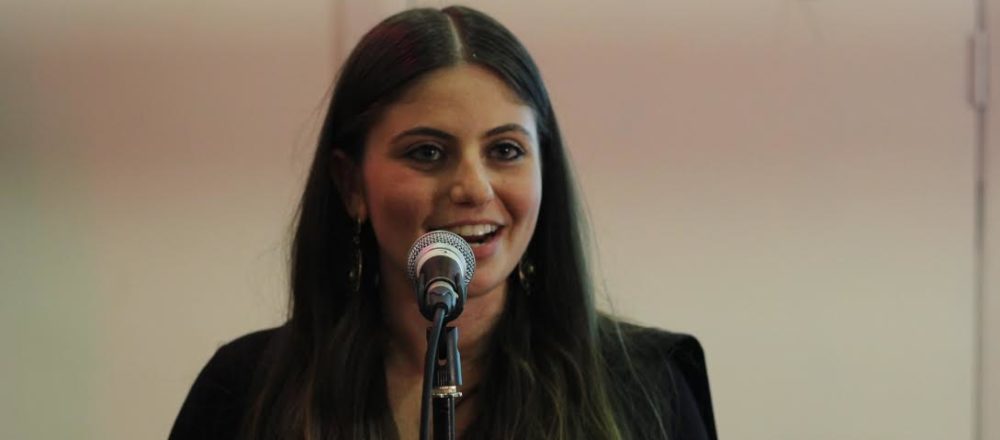What does creative storytelling have to do with self-determination? According to Jeanine Hourani absolutely everything.
Jeanine is an advocate, campaigner, educator and researcher. She is currently the Director of ‘Road to Refuge’ where she works to build the capacity of refugee storytellers and amplify their voices.
This week Jeanine hosted a panel of expert storytellers at Virtual Progress, Australia’s largest annual social change conference, to discuss how creative storytelling can be used as a tool for self-determination.
I spoke with her beforehand.
How has COVID-19 impacted self-determination and the way refugees and people seeking asylum share stories?
Pre-COVID, in the refugee space, we were seeing a move towards understanding and valuing the importance of self-determination and seeing lived experience as expertise. There was still a long way to go, but there was this broad understanding of ‘nothing about us without us’. People kind of understood this idea that we are the best people to tell our stories, and we are the best people to decide what policies and what programs are needed for our communities.
Then the pandemic hit.
Some groups were hit harder than others and refugees and people seeking asylum were disproportionately impacted. What we’ve been seeing is this resurgence of this idea of a white saviour complex and the idea of ‘service delivery’ being the only option for supporting refugees during this time.
We’ve seen more of the language of the Anglo-Christian model of charity about ‘who gives it’ and ‘who receives it.’ It has reinforced a lot of deficit-based language which reinforces the negative stereotypes that the movement spent so long trying to break away from.
In response to crisis, we need to give these groups more power, not less.
You have said that you hope that there is a ripple effect; the more people that are empowered to tell their stories, the more that will be empowered to do the same. Do you feel you’ve already had some success there?
At Road to Refuge we have our flagship program, which is called In My Own Words. And that program provides young refugee storytellers with the skills and opportunities they need to tell those stories on their terms and really take ownership of their narrative and represent themselves in a way that they want to be represented.
And we’ve now had two cohorts of that program come through and we’ve seen people really learn so much and really developed their stories and their skills as storytellers.
Through that program, for example, I caught up one of the participants from two years ago and she was just featured in a film. And as part of the promotional materials for the film, she did an interview. And I won’t say which media outlet it was with, but when the article was released she was really unhappy with the way she, as a refugee, was represented.
And so, she reached out to the journalist, had a discussion and explained some of the things that she had learned about how you should and shouldn’t represent certain populations using language and framing, and she was able to advocate for herself.
She changed the way that she was represented in that media article. And so that’s something like a really tangible outcome that we’ve seen from the program.
The reason I was inspired to start the program was because I came to Australia in 1997. Which was a very different time. It was still not ideal for refugees, but it was a better time than now in terms of policies of mandatory detention and things like that. And I saw the narrative really changed in 2001 with the children overboard scandal the Tampa crisis.
And because of that, the narrative around refugees and people seeking asylum really changed. It was politicized for political gain.
So, the reason I started the program was because I realized the power of telling my story and changing that narrative. There’s this whole idea of that it takes a story to displace a story. I realised that by me telling my story I was displacing the negative narrative that has permeated throughout Australian society for so long.
Now we’ve got 10 Alumni of the program who are all out there telling their stories to their diverse audiences. We’ve already got 10 new communities whose stories we are amplifying. If they then told their story to 20 people. If you multiply that, it’s a big impact.
In fact it’s more than 20 because people are going and writing articles and featuring in movies and these things have a pretty broad reach. So, we are seeing a kind of ripple effect too, and it’s reinforcing the importance of storytelling in changing public perception.
How have you changed the way you’ve told your own story over time?
When I was a ‘baby storyteller’ I think I came into it really thinking that I needed to prove that I was a good Australian or a good refugee. And I was part of the model minority. And really frame my story in terms of ‘we pay our taxes and we give to the economy and we do this and we do that’. When in reality our value as human beings aren’t based on how much we contribute to the Australian economy. And so, I’ve really changed the way that I think about how I talk about values and how I talk about human rights.
And how I talk about the fact that we’re all human beings, we all have this shared idea of community and society and what this should all look like and what everyone should have access to. And that is regardless of refugee status. And regardless of sexuality. And regardless of gender identity. And regardless of class and all of these things.
I really want to promote this idea of mutual respect, understanding and creating shared values and shared community, as opposed to making people think that in a very individualistic way that centers on outcomes and outputs and things like that.
What further changes do you want to see in the way that refugee’s stories are told and brought to light and published in Australia?
Refugees are such a diverse population and people become refugees in so many different ways. And with the climate crisis, we’re going to see more climate refugees. So, there’s going to be massive diversity in how people become refugees.
While being a refugee is one part of our identity, it’s not the whole part. And so we’ve got a lot of queer refugees. We’ve got a lot of gender diverse refugees.
My dream is for people to appreciate the diversity of our rich experiences as opposed to painting us with this broad-brush narrative that puts us all into a single basket. And homogenizes our experiences into one single experience. Because that is a great way of dehumanizing a whole population and turning us into a statistic.
This is the whole idea behind the ripple effect, because the more stories you get out there, the more you diversify the narrative. And I think that’s really important.
What’s next for Road to Refuge?
We’re going through Progress Labs at the moment. Which is the social change incubator run by the Centre for Australian Progress. Through that we have redone our strategy and we’ve done rethought our budget and thinking about ways we can grow our impact. We’ve got a few really exciting things coming up.
In terms of our strategy, we divide the work we do into three key pillars of work. The first is building capacity of refugee storytellers and providing ongoing support. The second is amplifying their voices through diverse mediums. And the third is influencing spaces and institutions where stories are told. This third one is actually kind of new to us.
But we’re really excited to be doing more in terms of working with arts and cultural institutions, working with the media, working with advocacy organizations. To make sure that the way that refugee stories are told and represented is in a way that we, as a community and as a group of people, feel represented and seen. Not in the way that the status quo is currently maintained. The control is still maintained and the power is still maintained by using white, old men in these institutions.
Why is creative storytelling more powerful than other types of storytelling?
Creative storytelling is effective as a tool. I think the reason for that is that we all know that the arts and creativity are inherently political.
If you look at any social change movement throughout history, there have been…There are artists and filmmakers and writers who have all come out of it and being part of the resistance, so to speak. But I think in the moment when you are all kind of consuming, it seems apolitical, it seems like it doesn’t matter who you vote for. It doesn’t matter what you believe.
This is something that we can all collectively buy into. It’s something we can all collectively learn from. I think given that the narrative is so highly politicized, removing that very highly politicized component from it through creative storytelling is a really effective way to build solidarity between all of us as a collective.
Change doesn’t happen in a vacuum. Putting creative story telling aside, what changes do you want to see in the traditional news media landscape?
We’ve been thinking a lot about how we engage with the media. I think there are lots of, there’s the very obviously “bad” media outlets, who do very negative things to perpetuate very harmful and very dangerous narrative.
Then I think even in the more progressive space. There are still media outlets who have these white journalists, even though they’re using the right language, these white journalists are telling our stories, not us ourselves.
On top of that… I engage with the media quite a bit. I’ve found that there’s kind of this appetite for me to kind of display my trauma on the page for them to consume. The power still lies in the editor and the media outlet and not in the individual and how they want to be represented.
So, I think there’s two parts.
The first part is holding those very, very problematic and very, very right-wing media outlets, accountable for perpetuating negative narratives. But then I think there’s a second part of that, which is getting these more progressive media outlets to do what they’re doing better and by transferring power to the individuals and the groups that they’re writing about.
It’s a really hard job. I think there are some organizations doing some really great work in this space. We’re really keen to start working with them and partnering with other organizations doing really great work in this space, in order to really change the way that media represents refugees and refugee issues.
That’s a great note to end on Jeanine. Thank you for making time to speak with Right Now.



